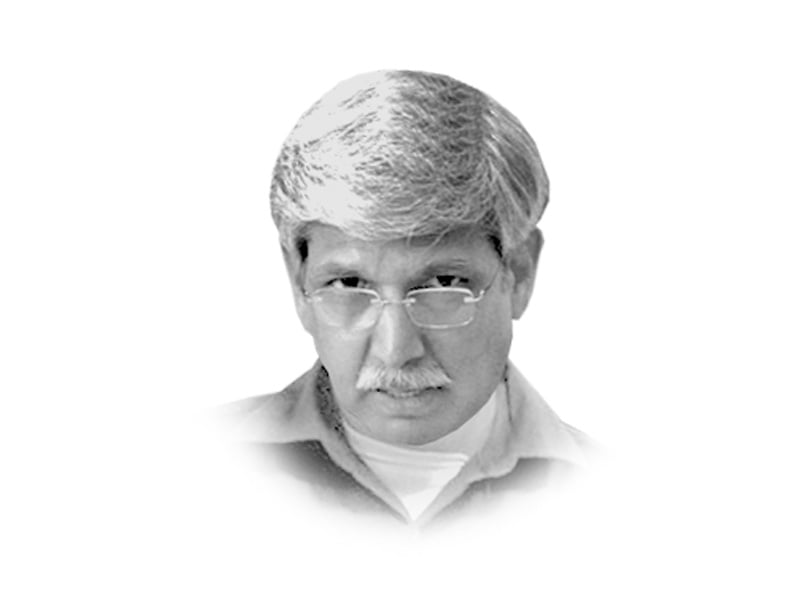
A win is a relative state; you do better than the other, you win; you still, though, may not achieve glory. Imran Khan might win, but what great feat is it to win from Nawaz Sharif or his cabal? What we have instead is something quite fabulous and promising, far more deep and reassuring than the lure of a superficial win: a movement built around the middle class of Pakistan, carrying the burden of asking questions of those who we, the people, elect as our representatives into Parliament. This was something, which was hitherto missing from our political equation. That is the change; that will be the change.

When Zulfikar Ali Bhutto stirred the people up in a similar movement, his target was the lowest strata of society: the deprived and the dispossessed; the real miserable, who till then simply existed in a state that they thought was perpetual. He told them they had rights; that, they were the real owners of the lands and the factories and the kilns that they laboured for. He made them relevant and gave them an identity. In a state as feudalistic in its social hierarchy as Pakistan, it wasn’t a mean achievement. Socialism, even if it was of an Islamic contraption, was revolutionary enough in a state such as Pakistan. He infused the idea, implemented it and took the course to reform society towards a more shared existence. Although a committed reformer, he changed course later back to the older order. It still was a minor revolution, not as classic as what Lenin had led or what Mao had enacted, but a change in the socio-political dimension all the same. Pakistan’s polity and society especially, changed for good, finding its new balance. The concern, as we revisit that eventful moment in our history, remains: why did it not sustain? And then: will this one sustain?
It should. It builds around the middle class, an educated lot of people, mostly professionals, and their families, who can each find time for a couple of hours every evening to show their support and solidarity with Imran Khan. The daily event at D-Chowk has turned into one of social mixing, heavenly idealism and some catchy music to go along with it as the crowd sways to the handsome Khan and the crooning that blares from the speakers. There are millions who watch the ritual with equal interest on their television screens. Free airtime to a political leader is a bonanza that Imran has used to great effect, while putting to question the credibility of the sitting government and infusing in the people an essence of democracy that defines it as a two-way contract between the people and the government they elect.
Just as Bhutto, Imran, too, has taught the people that they have a right to question the elite on their claimed entitlement to a status borne out of who they were born to. This touches the chord with the professionals who have had to work through achieving their degrees and their qualifications to make the grade; not so for the hereditary politico, though. This kind of social transformation, where the elite are put to question and shame by those who have earned their status rather than been bestowed with one, is the phenomenon that has touched the imagination of many. For a fledgling democracy in Pakistan, this remains new and empowering. This awakening cannot be a seasonal thing or something that is one-off, but a pattern of politics that must root itself into a shared responsibility in order to ensure fidelity in the political covenant.
Two aspects have seeped into our social attitudes based around this sense of empowerment: there is recourse to unmitigated arrogance bordering on outrageous misconduct — attitudinal, physical and verbal — that the newly empowered have exhibited in recent weeks, enfeebling the little sense of law and responsibility attached to it. It is not yet anarchy, but bordering on it. The other is salubrious: the capacity and ability to ask questions and defend one’s rights, which is the essence of a responsible democratic system. The traditional elite just might hate what they see brewing and have thus distanced themselves from it; rather disturbingly, those below the poverty line, too, remain alien to the process.
Assuming that the political elite is chastened by this newly injected sense of social accountability, and their governance attitudes undergo a significant improvement, how long will it take for the trickledown impact on the lives of the poor and those at the bottom rung in the system? There surely will be spin-off benefits, but in satisfying the educated middle class and their insistent sense of propriety, the political leadership may simply deal with what is urgent, leaving those at the bottom untouched.
Second, will the middle class and those around whom this tehreek seems to build continue to retain the sense to question and monitor how the elite deliver; or having achieved what to them is an upstaging of the powerful, they, too, now will revert to their already comfortable lives, their sense of propriety taking leave off their momentary sense of social sensitivity? Pakistan’s experience with such failures has been unusually stark: a martial law followed Bhutto’s time although there were other reasons for it also.
Then there is the issue of timings: has Imran Khan been pushed into an early hype in his canvassing? What if the elections, even if early, are still two years from now? How will he sustain the momentum of his political thrust, which seems to be almost touching the peak of popularity already? The smarter politician only needs to displace Imran’s phenomenon on the timeline of political play and the Khan may well find himself at a wrong place at a wrong time.
This remains the most fascinating moment in Pakistan’s recent political experience. The question is: is this only a momentary hype or an abiding trait? What Bhutto could not, can Imran achieve? Imran’s own capacity — severely limited — and the resilience of the middle class — highly doubtful — make it a suspect venture.
Published in The Express Tribune, October 4th, 2014.
Like Opinion & Editorial on Facebook, follow @ETOpEd on Twitter to receive all updates on all our daily pieces.
COMMENTS (23)
Comments are moderated and generally will be posted if they are on-topic and not abusive.
For more information, please see our Comments FAQ

1721394099-0/BeFunky-collage-(22)1721394099-0-165x106.webp)


1732762837-0/Taylor-(3)1732762837-0-165x106.webp)







Mr W Churchill, the UK Prime Minister once said in so many words that: "democracy was not a particularly good form of government. It was just better than any other form of government". I think he meant that nothing really happens. Therefore, although I hope that Pakistan can improve, it is my experience, by looking around the world, that when a new crop of leaders take over they find the problems too great, they usually have to fall in line with the power brokers wishes, and there is little change.
@asim: Very interesting comment; It's true that the same ex military types have one face when there is their favorite dictatorship and always support opposition when there is democracy. Don't they see that a stable society only comes from a strong democratic system and strong institutions that will take a few democratic cycles to evolve in a developing country like Pakistan. Instead some support unlawful dharnas and violentt protests since they don't believe in developing democracy.
Yes, they will deal with what is most urgent. But that opens the door. Someday, that will be urgent.
There are definitely some positive outcomes out of PTI/PAT dharnas and I think it does help in many ways to have such events to force the general public to think which path they want to choose in the next elections.
Imaging for a moment our democracy as a sail boat. It is one thing to adjust your "sail" to take maximum advantage of the wind that is blowing to navigate the sail boat...however let's not forget the "rudder" which needs to be adjusted to facilitate the sail boat (of democracy). Who I would ask is controlling or operating the "rudder"...it is not the elected politicians...right? There is a significant paradigm shift needed for the entity controlling the rudder to be on board with sailing in the direction where the people of our country want to go...agreed?
As an x-insider what would you propose...how do we cause this paradigm shift? Should we use the method of setting the "sons of our soil - terrorists" against the entity controlling the rudder to cause the paradigm shift...if that works then how do we control the "sons of our soil - terrorists"? What other recourse is left?
Will it sustain, or spiral into total anarchy? The most important similarity between Bhutto and Imran is that they manipulated people through incoherent muddle of lies and smoke screens. Even if Pakistan manages to become an economy as big as India, the average person will not be better off than Angola, that's as far the numbers speak. What IK has achieved though is deepening the fragmentation in an already polarised society, which has the potential of transforming into a civil war. This solution perfectly suites some global powers who don't want China's navy to have access to western Indian Ocean. That's precisely why IK was celebrating on the cancelled Chinese president visit.
Best analysis i've seen so far.
I really feel pity for you for joining a dying party, having to listen to the pearls of wisdom of a twenty year old kid. Is that all you could find after a long, distinguished career in the armed forces?
Please do not underestimate Imran's support base--"Marsoon, marsoon, Imran na churraisoon"
What a boring article with almost no substance!
An excellent summation of what's happening. In her book BB writes that her father told her ' .....always remember the real power rests with the people '........she, then her husband,and now Nawaz ( lets not forget Musharraf ) all failed to heed this advice once they came into power. Imran has motivated the middle class, something never done before, and it was easy because the timing was right ( they were frustrated ) and he is speaking their language. I read that the French revolution did not start on the streets of Paris it started years ago in the coffee shops where the intellectual middle class gathered and talked ( the internet / media today ) Nawaz has adopted the strategy of sticking his head in the sand and saying ' it will all blow away '........even if it does, when he along with Zardari, Altaf, Fazl-u-Rehman, the Wali, the JI and the boys open their eyes, they will have to face up to a changed reality.
Another Imrani qaseeda....why do people from military institutions always support opposition when there is democracy and Badshah salaamat when dictatorship?
Sir, You really damaged your own credibility by joining a sorry lot standing behid an immature chap as their leader. What're his services, capabilities and merit to qualify as Chairperson?
The dharnas have been a farce for so many reasons but I would just like to state one which seems to have been ignored by most commentators. The rhetoric coming out of IK is rlection time rhetoric which we all said and heard in 2013 in the run up to elections. People listened and already gave their verdict even if some irregularities took place in this process. PTI got the seat in KPK. The next logical step is to deliver and then try to gain greater majority next time. It is this middle step which PTI is so non chalantly ignoring. In the absence of proof, all this renewed rhetoric is just lot of hot air.
After reading this piece from this AVM I feel there was a flaw in the promotion/selection system of PAF then.His knowledge if history is outragiously biased and distorted. A fan of ZA Bhutto is as untrustworthy today as was Bhutto who in league with Mujeeb and Indira broke up our country. Then through Divine Justice all three were executed by their own people. Today the rulers should shudder. Divine Justice may be around the corner unless those murdered in Modal Town and Islamabad do not get Justice.
Dampening the only hope of Nation is a Crime.... don't even think of it ....... Making possible what was impossible for people like you has been practice of Imran Khan and that is why he is a leader ........ Go Nawaz Go
You, Sir, lost all credibility when you bowed before your supreme leader; Billawal Sahab as you call him. Please stick to making botched arms deals with PAF.
An excellent piece of writing. This is first good analysis on the phenomenon and its possibilities. Written in a very balanced manner. congrats. Excellent sir.
All this borrowed philosophy can hardly be applied to a movement propped be the military in order to regain, increase and expand their hegemony. Nothing of the sorts of social changes and middle class reawakening are visible. What is visible is that our half educated youth having access to social media and charmed by the gimmicks of a performer with unprecedented TV exposure are not ready to take over and run this country responsibly. It has exposed something is deeply flawed with our education system. Those supporting go Nawaz go on social media are abusive, crude and lacking imagination. I see this movement another "hamain manzil nahi rahnuma chahiye " .
People, however poor or lacking in education, can not be fooled in a democratic system, India proving it number of times in the past. Imran Khan is that opportunist politician in Pakistan who is out to cash in on Pakistani peoples' anger and frustrations with various issues like power shortage, law and order in Karachi and other parts of Pakistan, education, healthcare etc. and also against America.
But the people of Pakistan will not like to see the democratically elected Govt. of Nawaz Sharif be derailed. They have seen through Imran Khan's game plan and do not trust a person who has no experience or credibility in governing a province, let alone a country.
You and Shahid Latif should stick to playing golf. Both of you are scum of the earth . It was the two of you who were egging on miscreants TuQ and IK to derail democracy
"What we have instead is something quite fabulous and promising, far more deep and reassuring than the lure of a superficial win: a movement built around the middle class of Pakistan, carrying the burden of asking questions of those who we, the people, elect as our representatives into Parliament. This was something, which was hitherto missing from our political equation. That is the change; that will be the change."
This is indeed comendable. Next step:a movement asking questions of those who are not elected by anyone but who help themselves to majority of the budget leaving little for education, health, infrastructure.
This is one of the better Op Ed by the writer. However, considering a man in his mid 60's and two decades in politics is naïve. The real leaders do not emerge in their retirement age but very early. IK has peaked and the middleclass is not majority in our country. While ZAB connected with the poorest of the poor and progressives, IK was banking upon JI and third empire to hand him power.
Agreed, but who'll even read this article now to see your affiliation with PPPP..Are you kidding me ? Any sane, educated person supporting a party of Bilawal, Khursheed Shah, Gillani and Amin Fahim to name a few? Mr. AVM you are not even close to a relative win or a marginal loss. You loose big time. I can understand people or poor political workers who are/were already part of PPP but you joining PPP now?
Bhutto did not stir anyone up except the mullas. He needed their support. He sold the country downriver. . Well yes, you can call him the Bisector. He bisected the country in two.